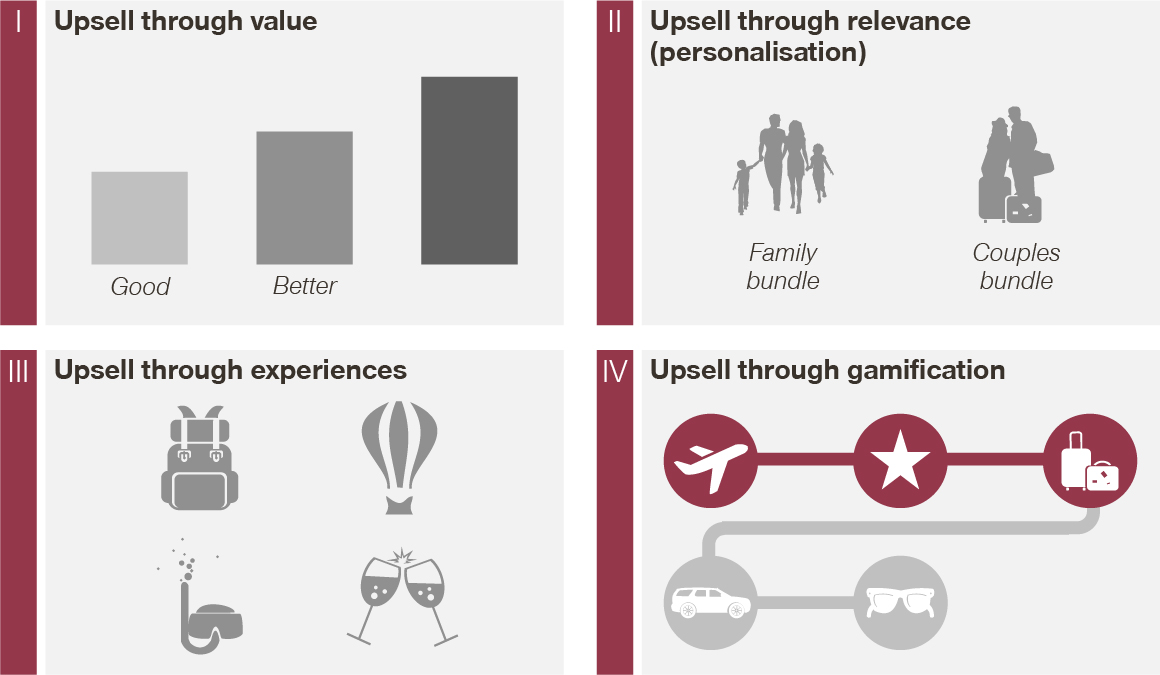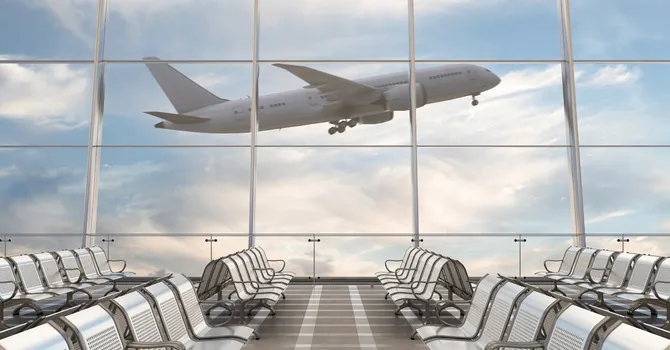*The insights and recommendations shared in this article are based on the circumstances as of April 23rd, 2020
In this multi-part series, we discuss how travel companies can respond to the unprecedented crisis triggered by COVID-19. In part one, we looked at the three core phases of the crisis and introduced our nine-point action plan. In this article, we take a closer look at each of the action points, highlighting ways to rebalance marketing spend, boost up- and cross-selling, avoid heavy discounting, plus many other essential measures to withstand the crisis.
Now well into the pre-peak period of the coronavirus pandemic, the main focus for travel companies is on closing operations and ensuring the ability to handle customer enquiries. Still, there are some key commercial measures travel companies can take to succeed. Based on three core themes — adjusting the offering, redefining the pricing strategy, and focusing on lifetime value — here are nine action points for travel companies to respond to COVID-19:
Adjust your offering
1. Repurpose capacity to support the crisis and build brand equity
Most travel companies have had to close their operations, either by cancelling flights, grounding planes, closing holiday parks, or locking up hotel rooms. As the physical capacity still exists, clever-minded travel companies have found innovative ways to repurpose their capacity and build considerable brand equity. Hoteliers like Best Western have offered their properties as temporary hospital beds to the NHS, Gatwick airport has transformed their car-parks into COVID-19 testing centres, while Addison Lee has set up a “donate a ride” campaign to offer free taxis to NHS staff. All the above cases are brilliant initiatives that make use of the available capacity while building a positive brand image for when things return to normal.
2. Re-balance marketing spend toward existing customers
Travel companies are well equipped with marketing tools to drive customers to their sales channels, such as pay-per-click advertising, media advertising campaigns, social media campaigns, as well as in-house promotions and commissions to travel agents. Most sophisticated travel companies have marketing effectiveness processes and algorithms that identify the optimal mix of their marketing spend on these channels on a daily basis. However, many of these activities are no longer relevant. In periods of subdued demand, attempting to lure new customers is expensive and ineffective. Instead, any marketing spend should be focused on existing customers through traditional in-house CRM channels. Existing customers have a brand affinity that makes them most likely to respond to any communication or offer. Therefore, promotional and communication activity should be focused on these customers, with spend on channels that bring in new customers put on hold to preserve cash.
3. Shift communication and sales channels to digital
Travel companies have been swamped with calls from customers who are anxious to find out the status of their existing booking, putting considerable strain on call-centres. At the same time, non-digital channels like brick & mortar travel shops have been closed. For companies to ensure they can continue providing customer support and protect any future sales, it is important to shift customer support, sales, and communication to digital channels. Platforms like apps, websites, webchats, or even self-serving online forms to process refunds are vital to ensure smooth communication between customers and companies. On a positive note, almost all travel companies have well-established digital channels that their customers visit, and do not need to develop these platforms from scratch.
Redefine your price strategy
4. Stop price discounting
Most travel companies will have a Revenue Management System that is used to adjust prices daily based on changes in demand, competitor action, and other factors. Even the few systems that are able to respond to quick and large deviations will immediately react by dropping prices, as they assume that this will stimulate demand. However, this demand crisis is not price-driven; so the systems are delivering the wrong solution. Instead, travel companies should switch off any price discounting triggered by these systems and revert to simpler and manual pricing or even leave prices unchanged. In some cases, such as last remaining flights used to repatriate expats, significant price increases should be capped to avoid being seen as profiteering.
5. Promote value
Similarly, promotions should not be price-driven during this crisis, as a great deal or price will not shift the needle on demand. Instead, since there is relatively ample capacity available, travel companies should offer value-driven promotions like a free upgrade to a higher class or a better room. Rather than a considerable price reduction, a better experience will be far more appreciated. This is the time to win customers for the future. Making these kinds of offers will give travel companies considerable points in their NPS.
6. Up- and cross-sell
In instances where people are still booking holiday and travel products, companies should ensure they upsell ancillary products that typically carry a higher margin than the core travel product. Such a strategy should apply even in normal times, but this is more critical now as companies place more value on cash and preserving profitability. In our experience, upselling is effective provided it is relevant to costumers (e.g. up-selling a bigger room to a family, but a nicer view to a couple), is portrayed as enhancing the experience (e.g. premium, luxurious), and uses gamification to incentivize a purchase. Gamification has been found to be almost three times more effective than traditional shopping-cart upselling and is increasingly becoming the most effective way to up-sell ancillaries.
Ways for travel companies to maximise up-selling.

Focus on lifetime value
7. Offer flexibility
The crisis has created considerable uncertainty among customers in terms of travel and holiday plans; no one knows when they can go on holiday again and whether they can travel abroad. However, a lot of travel offerings like airfares and hotel bookings have product variants that come with conditions and charges for changes, cancellations, and refunds. Sticking to such a product set-up becomes a considerable barrier for customers to book travel for days further in the future. Travel companies should move to flexible conditions in their bookings, promising to not charge customers for changes, cancellations etc. This removes a key barrier for customers to book in such uncertain times and provides travel companies a better chance of getting bookings in a period where cash is critical.
8. Extend loyalty
Loyalty schemes are a very effective marketing lever for travel companies these days. They form an important consideration for customers when booking their airfare or hotel room, as they strive to receive the provided benefits but also achieve a “status” like Gold, Silver, or Bronze. However, to maintain or reach a certain status, customers need to continue travelling at a regular frequency. The crisis has meant loyal customers can’t maintain their usual frequency of travel and, as such, are at risk of losing their status. Simple gestures like extending the benefits or the validity period are cost-effective measures that score considerable brownie points with loyal customers. This is something that has been adopted by all major airlines. Some, like Aegean airlines, have gone even further by offering customers the option to donate miles to healthcare workers to go on holiday after the crisis, which Aegean matches three times in return for every donation. That is a great gesture by Aegean that not only builds brand equity, but also enables them to maintain a positive relationship with their customers.
9. Incentivize future purchases
Let’s face it, it will take some time for customers to travel again. However, at the same time, customers are dreaming of going on holiday and escaping the isolated conditions of the lockdown. According to Sojern, UK searches for holidays to Spain in 2021 are up 1600% compared to last year, and holidays to France up by 409%. Travel companies should embrace this trend by launching their inventory and flying program for 2021 earlier than usual, giving customers more options to book their 2021 holiday. They can also offer incentives for people who want to cancel their 2020 travel plans by offering them, instead of a refund, a voucher to book for 2021 at a value higher than the one they originally booked; for example, if someone paid £1,000 for a holiday in 2020, they receive a credit voucher worth £1,250 for 2021 holiday instead of a refund. This not only protects the cash situation for the travel company today, but also provides a clear incentive for customers to rebook in 2021 and maintain the relationship with the travel company.
Conclusion: Travel companies will endure
Although at the moment it may seem like the travel industry is doomed, let’s not forget that, for most of us, travel is the biggest leisure activity of the year. It is our escape from working life and the time to reconnect with family and loved ones. There is no doubt that travel companies will endure; they have gone through many crises in the past. In the interim, we recommend travel companies to adopt these nine points across their commercial operations.
We will soon move to the post-peak period of the pandemic, where travel companies will shift focus on how to re-open their businesses in the new world and maximize their revenue and cash while building and maintaining excellent customer trust. The next series of our COVID-19 series on travel will cover this period in more detail, outlining an action plan for both capacity and demand management in the post-peak period. Until then, we are working with our clients in the travel industry to help them implement our advice and support them through these tough times.
Interested in learning more about what we offer? Feel free to connect with our Travel, Tourism, and Leisure experts.








